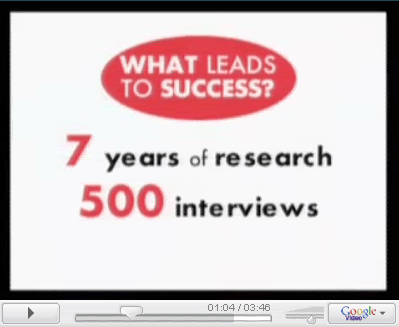Dear Friends,
Customer surveys come up with some interesting findings.
If I were to break down the findings of the customer surveys I've reviewed over the past years they would begin to reveal a pattern. Certain commonalities appear regardless of the industry, product, or service provided.
Although the words used to describe each factor would be a bit different, the feelings behind them would find themselves in four separate and distinct categories.
These are the 4 factors customers care about. This is what's important to them.
In our last 3 Minute Referral Tip I shared with you the relationship between your Core Service and your Customer Service. Your ability to distinguish between your Core Service, "what customers see" and your Customer Service, "what customers feel" will open your service delivery to both managing your product and managing the customer's perception.
Both matter.
Your repeat and referral business is the focus on customer service.
Your aftermarketing efforts will not produce results in the absence of quality.
So, what do customers really want when it applies to how they want to be treated?
Here are the 4 primary factors that are critically important to your customers.
- Care and Concern
At the top of the list. How do you convey Care and Concern? I'll give you a clue. It's not because you say you are. It's behaved. It has to be witnessed by the customer. Just as your intentions will not get you out of problems you behaved into, your ability to be reliable, responsive, attentive, empathic, patient, understanding, will be observed by the customer and evaluated to be Caring and Concerned. - Spontaneity
Where did this come from you ask? The ability of a service provider to be flexible and the skill to find a solution that may be outside the normal procedures gives the customer a personalized answer to their
personal situation. Customers love this. When a problem comes up that doesn't fit the Standard Operating Procedure book a service provider that has the ability to quickly think and react at their own discretion on the customer's behalf is greatly valued and often referred. - Problem Solving
This may appear to be a "no-brainer" because everyone should know how to execute a solution to a customers specific problem. Whether it's an expertly filed brief, an accurate tax return, a 100% completed 1003 or a properly filled out purchase agreement, depending on your industry, we all should know the how to. The real skill in problem
solving lies in the preparation or diagnosis of a customer's situation. It's knowing what questions to ask that reveal the entire picture. It's not rushing to a solution or sale, it's the effort in listening and understanding the customer's needs and objectives. - Recovery
This may surprise you. It is a very important and a reoccurring concern from the customer's point of view. If something goes wrong, as it often does, will anyone make a special effort to make it right? Will someone go out of his or her way to make amends to the customer? This is a big one! In our business we used to play, "Find the Disgruntled Customer." It was our behavior to call our customer throughout their transaction and after the closing to make sure they were comfortable with the service they were receiving, and after the closing with the home that they just bought and moved into. If something was wrong we wanted to be the ones that found it. In our world, whoever called first won.
We went looking for problems. Ninety five times out of a hundred our customers were delighted, and when we found a problem we jumped on it to solve it. Our service reputation was created in a large part by this one single behavior.
The 4 factors critically important to customers.
Care and Concern
Spontaneity
Problem Solving
Recovery
I suspect there's nothing really new here, but it does capsulize the 4 areas that customers find important.
As a consumer we know how important they are. On the surface they look different from one another, but in actuality there is a common thread.
They are all personal and require the ability to see things from the Other Person's Point of View and the skill to manage the customer's perception.
The more you manage perception, the more you can exceed expectations, and the more referrals you'll get.
Referrals are all about relationships. In any relationship the ability to see things from the others person's perspective is a common critical factor in its survival.
The longer a referral relationship exists and grows, the better your business referrals becomes.
Thanks for spending 3 minutes with me.....
The best is yet to be!
Your Trusted Advisor For Life.
Jeffrey Stanton
You read Jeffrey's Journal every week because you, like me want the best for yourself.
And you, like me want to build a strong referral based business.
Who else like you, like me loves referrals that you can share this blog with right now?


































No comments:
Post a Comment